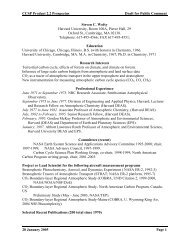Decision support experiments and evaluations using seasonal to ...
Decision support experiments and evaluations using seasonal to ...
Decision support experiments and evaluations using seasonal to ...
You also want an ePaper? Increase the reach of your titles
YUMPU automatically turns print PDFs into web optimized ePapers that Google loves.
in climate <strong>and</strong> weather (Garfin <strong>and</strong> Emanuel,<br />
2006); stewards are encouraged <strong>to</strong> participate in<br />
drought impact moni<strong>to</strong>ring through Arizona’s<br />
Local Drought Impact Groups (GDTF, 2004;<br />
Garfin, 2006). MWS enhances the capacity for<br />
communities <strong>to</strong> deploy new climate information<br />
<strong>and</strong> <strong>to</strong> build expertise for assimilating scientific<br />
information in<strong>to</strong> a range of watershed management<br />
decisions.<br />
4.3.6 Funding <strong>and</strong> Long-Term<br />
Capacity Investments Must<br />
Be Stable <strong>and</strong> Predictable<br />
Provision of a stable funding base, as well as<br />
other investments, can help <strong>to</strong> ensure effective<br />
knowledge-action systems for climate change.<br />
Stable funding promotes long-term stability<br />
<strong>and</strong> trust among stakeholders because it allows<br />
researchers <strong>to</strong> focus on user needs over a<br />
period of time, rather than having <strong>to</strong> train new<br />
participants in the process. Given that these<br />
knowledge-action systems produce benefits<br />
for entire societies, as well as for particular<br />
stakeholders in a society, it is not uncommon<br />
for these systems <strong>to</strong> be thought of as producing<br />
both public <strong>and</strong> private goods, <strong>and</strong> thus, needing<br />
both public <strong>and</strong> private sources of <strong>support</strong><br />
(Cash <strong>and</strong> Buizer, 2005). Private funders could<br />
include, for example, farmers whose risks are<br />
reduced by the provision of climate information<br />
(as is done in Queensl<strong>and</strong>, Australia, where the<br />
individual benefits of more profitable production<br />
are captured by farmers who partly <strong>support</strong><br />
drought-warning systems). In less developed<br />
societies, by contrast, it would not be surprising<br />
for these systems <strong>to</strong> be virtually entirely<br />
<strong>support</strong>ed by public sources of revenue (Cash<br />
<strong>and</strong> Buizer, 2005).<br />
Experience suggests that a public-private funding<br />
balance should be shaped on the basis of<br />
user needs <strong>and</strong> capacities <strong>to</strong> self-tailor knowledge-action<br />
systems. More generic systems that<br />
could afterwards be tailored <strong>to</strong> users’ needs<br />
might be most suitable for public <strong>support</strong>, while<br />
co-funding with particular users can then be<br />
pursued for developing a collaborative system<br />
that more effectively meets users’ needs. Funding<br />
continuity is essential <strong>to</strong> foster long-term<br />
relationship building between users <strong>and</strong> producers.<br />
The key point here is that—regardless of<br />
who pays for these systems, continued funding<br />
of the social <strong>and</strong> economic investigations of the<br />
<strong>Decision</strong>-Support Experiments <strong>and</strong> Evaluations <strong>using</strong> Seasonal <strong>to</strong><br />
Interannual Forecasts <strong>and</strong> Observational Data: A Focus on Water Resources<br />
use of scientific information is essential <strong>to</strong> ensure<br />
that these systems are used <strong>and</strong> are useful<br />
(Jacobs et al., 2005).<br />
Other long-term capacity investments relate <strong>to</strong><br />
user training—an important component that<br />
requires drawing upon the expertise of “integra<strong>to</strong>rs”.<br />
Integra<strong>to</strong>rs are commonly self-selected<br />
managers <strong>and</strong> decision makers with particular<br />
aptitude or training in science, or scientists who<br />
are particularly good at communication <strong>and</strong><br />
applications. Training may entail curriculum<br />
development, career <strong>and</strong> training development<br />
for users as well as science integra<strong>to</strong>rs, <strong>and</strong><br />
continued mid-career in-stream retraining <strong>and</strong><br />
re-education. Many current integra<strong>to</strong>rs have<br />
evolved as a result of doing interdisciplinary<br />
<strong>and</strong> applied research in collaborative projects,<br />
<strong>and</strong> some have been encouraged by funding<br />
provided by NOAA’s Climate Programs Office<br />
(formerly Office of Global Programs) (Jacobs,<br />
et al., 2005).<br />
4.3.7 Adaptive Management for<br />
Water Resources Planning—<br />
Implications for <strong>Decision</strong> Support<br />
Since the 1970s, an “adaptive management<br />
paradigm” has emerged that is characterized<br />
by: greater public <strong>and</strong> stakeholder participation<br />
in decision making; an explicit commitment<br />
<strong>to</strong> environmentally sound, socially just outcomes;<br />
greater reliance upon drainage basins<br />
as planning units; program management via<br />
spatial <strong>and</strong> managerial flexibility, collaboration,<br />
participation, <strong>and</strong> sound, peer-reviewed<br />
science; <strong>and</strong> finally, embracing of ecological,<br />
economic, <strong>and</strong> equity considerations (Hartig<br />
et al., 1992; L<strong>and</strong>re <strong>and</strong> Knuth, 1993; Cortner<br />
<strong>and</strong> Moote, 1994; Water in the West, 1998;<br />
May et al., 1996; McGinnis, 1995; Miller et<br />
al., 1996; Cody, 1999; Bormann et al., 1993;<br />
Lee, 1993). Adaptive management traces its<br />
roots <strong>to</strong> a convergence of intellectual trends<br />
<strong>and</strong> disciplines, including industrial relations<br />
theory, ecosystems management, ecological<br />
science, economics, <strong>and</strong> engineering. It also embraces<br />
a constellation of concepts such as social<br />
learning, operations research, environmental<br />
moni<strong>to</strong>ring, precautionary risk avoidance, <strong>and</strong><br />
many others (NRC, 2004).<br />
Adaptive management can be viewed as an alternative<br />
decision-making paradigm that seeks<br />
Regardless of who<br />
pays for these<br />
systems, continued<br />
funding of the social<br />
<strong>and</strong> economic<br />
investigations of<br />
the use of scientific<br />
information<br />
is essential <strong>to</strong><br />
ensure that these<br />
systems are used<br />
<strong>and</strong> are useful.<br />
125




